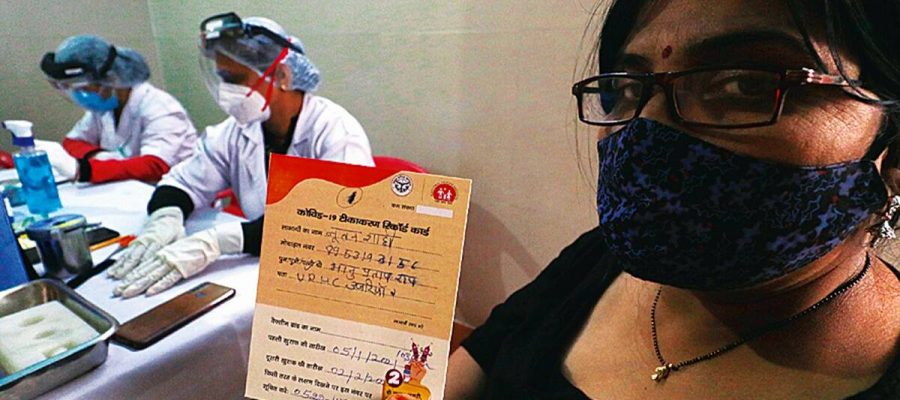The decision on rolling out India’s biggest adult vaccination drive will, however, be taken by the central government, the Union Health Ministry.
The Union Health Ministry said on Tuesday that stakeholders at the Centre and states were prepared to roll out the mass immunisation programme against Covid-19 within 10 days of the vaccines getting approval.
The decision on rolling out India’s biggest adult vaccination drive will, however, be taken by the central government, it said.
Two vaccines — Covaxin developed by Bharat Biotech with Indian Council of Medical Research (ICMR), and Covishield, a variant of Oxford AstraZeneca’s AZD1222 manufactured under licence by the Serum Institute of India — got regulatory approval for restricted use in emergency situation on Sunday.
“The national dry run (on Saturday) looked at four areas: testing operational feasibility of Co-WIN (software platform) in largescale use; assessing linkages between planning, implementation, and reporting mechanisms; identifying challenges and addressing them before actual implementation; providing confidence to programme managers at various levels,” Health Secretary Rajesh Bhushan said.
Explained: What next for Covid-19 vaccine rollout in India?
“We conducted the dry run in 286 session sites, and examined the operationalisation of SOPs and protocols. On the basis of this exercise, we are prepared for a rollout of the Covid-19 vaccine within 10 days from the date of Emergency Use Authorisation granted by the regulator,” he said.
“The accelerated approval came on January 3. We are prepared to roll out within 10 days after the approval was given. The final decision will be taken by the government,” Bhushan said.
At the briefing, the first after the approvals were granted, the Centre responded in detail to concerns over Covaxin being cleared without phase 3 efficacy data.
ICMR DG Dr Balram Bhargava said statutory rules framed before the pandemic allow the regulator to grant restricted use approval on the basis of phase 2 data in emergency situations.
“The New Drugs and Clinical Trials Rules of March 19, 2019, say that if remarkable efficacy is observed with a defined dose in phase 2 clinical trial of a new drug for unmet medical needs of serious and life-threatening diseases, it may be considered for grant of marketing approval by the central licensing authority based on phase 2 data,” he said.
“In a pandemic situation”, restricted use approval is considered based on safety and immunogenicity data while phase 3 trials are still ongoing, Dr Bhargava said. “Immunogenicity data generated through phase 2 clinical trial serves as a surrogate for efficacy. And the clinical trial Rules 2019 provide for considering phase 2 results to guide approval.”
Dr Bhargava said, “safety, efficacy, and immunogenicity are required for approval of a vaccine in a non-emergency situation”; however, “existing pandemic situation with high mortality, available science, and a lack of definitive treatment are considered by SEC (Subject Expert Committee) for accelerated approvals…which is in our legal provision.”
Dr V K Paul, who heads the high-level national committee on vaccine administration, said Covaxin’s technology was the key scientific principle that led the SEC to recommend the granting of emergency approvals without efficacy data.
“…It is a vaccine with an exciting antibody response, not just S-protein but also the additional proteins…in the face of potential mutations, because this vaccine is a whole virion vaccine and makes antibodies at multiple targets… This was noticed by SEC; secondly in their judgment, they have said this vaccine is to be used in clinical trial mode. Therefore, scientific principles and rigour have been followed,” Dr Paul said.
“I would like to emphasise and reiterate that in granting this permission all scientific and statutory requirements have been met. These decisions are being made in a context; this is not a regular authorisation. The world is exercising this option using scientific criteria, thinking and consensus to take decisions in the larger interest of public health,” he said.
Dr Bhargava gave details of the grant of approval to Covaxin in “clinical trial mode”. “In phase 3, with 25,800 participants, there have been no safety concerns after the first dose; and 5,000 have been given the second dose. Therefore, restricted use [approval] has been given in clinical trial mode; which means that they have to give consent, and there has to be regular follow-up,” he said.
“The manufacturer has been requested by the drug controller to provide the SoPs and protocol for the clinical trial mode. In a clinical trial mode, there will be no placebo,” he said.
Explained: Covid-19 vaccination FAQs
Bhushan confirmed on Tuesday that the Indian government has not banned the export of any Covid-19 vaccines. During the briefing, Department of Biotechnology Secretary Renu Swarup said the number of samples identified with the more contagious UK strain of the virus had now reached 71 in the country.
Source: Read Full Article


